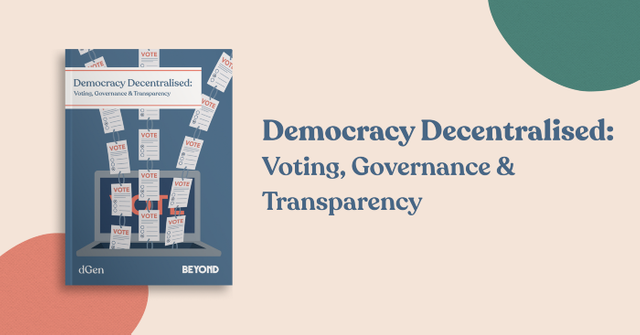Democracy Decentralised

Alternatives to Our Current Voting & Governance Schemes
Millennials saw the development and growth of many technologies. However, many of these technologies are also already outdated as digitisation and innovation march on. They have impacted almost every aspect of our lives. Previous generations had to adapt quickly to this change, while new ones do not even imagine how the world was before the rise of the internet.
Although communication was largely affected by technological progress, one pillar of our society has been left behind: our democracies. While we can easily communicate with someone on the other side of the world or get real-time news, voting systems and most governance services are still analogue. This is largely due to great security risks. However, in their current iterations, our democracies are languishing and becoming less effective, with lower voter turnout year after year.
Once again, the challenges posed by the Covid-19 pandemic stressed the weaknesses of our political systems. Throughout the world, elections — the core of democratic processes — have been compromised. Those with online voting systems already, were best prepared to deal with the crisis at hand.
This year, numerous, perhaps too many, events threatened the legitimacy of democratic elections. Transparency, ballot access, and fraud cropped up, perhaps not at unprecedented rates, as our democracies have had issues for decades, but in a manner that seems more pressing than ever. Clearly, it is time to consider new innovative proposals to make our democracies healthier. By observing one of the most watched elections globally — the US Presidential elections — we explored current online voting systems and new feasible solutions in our report, “Democracy Decentralised: Voting, Governance & Transparency”. In this, we focus on solutions coming from blockchain communities, for their innovative look at voting and governance models.
As blockchain-based initiatives still need improvements, we try to cover major technical and social risks related to blockchain-based voting systems, and i-Voting in general. However, research is well on the way to finding workable solutions bringing many benefits to recover our democracies. Particularly Decentralised Autonomous Organisations (DAOs) and Quadratic Voting offer necessary interventions to the very core of how democracies function.
What could the next 10 years bring?
Changes must happen sooner than later to allow our democracies to continue to represent citizens’ interests, and revive young generations’ trust in political systems. Based on this, we recommend and expect:
- The EU Parliament should trial quadratic voting in the next 5–10 years.
- DAOs will begin to be used by multinational civil societies and smaller, digitally robust villages.
- Voter turnout will be bolstered by greater transparency and more reactive democracies.
- Online voting will be an option in five to seven countries by the 2029 EU elections.
- Online voting will increase the number of referendums and special elections.
Our democracies have stagnated for too long. Technology may not be the only solution to decentralise power back to citizens, but it presents many potential solutions, and is one that we continue to look to.
Thank you to all of the insights we received from experts in voting technology. If you have any feedback or questions, please get in touch at [email protected].